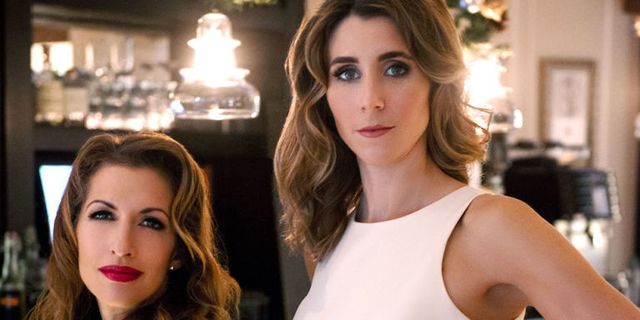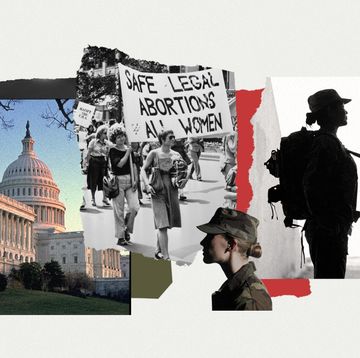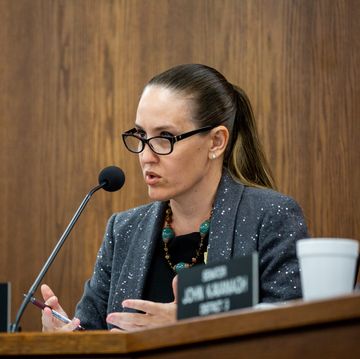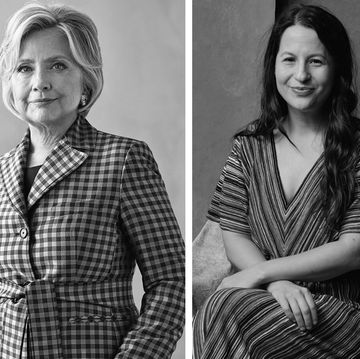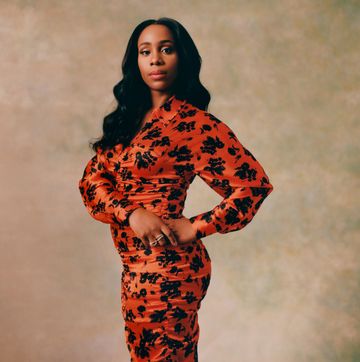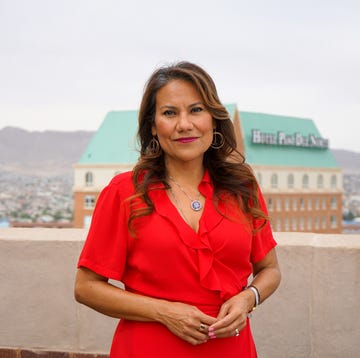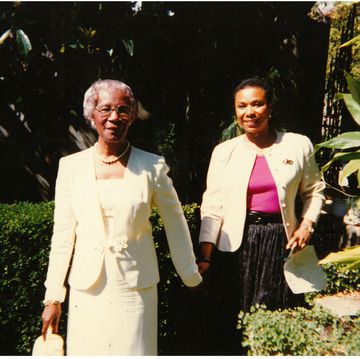Described to the average moviegoer, Equity sounds like a thriller you've already seen. It's set on Wall Street, exposing the dark universe of corruption that too much money creates. It turns a critical eye on IPOs gone awry, shady startup culture, and greed. It lingers on a very pretty blonde. And its producers are already banking on a sequel.
But Equity is no traditional Hollywood blockbuster, at least not behind the scenes. Plot twist!: women produced, wrote, and directed the movie. They star in it, too, in critical roles, sharing screen time with men in supporting parts. On both sides of the camera, women call the shots. And that's a story you probably haven't seen play out before.
The mere presence of women on screen is rare in Hollywood. A researcher at the University of Southern California found that women were given only 30.2 percent of speaking or named characters in the 100 top-grossing fictional films released between 2007 and 2014. And women directors—they're unicorns. Women made up 1.9 percent of the directors for the top 100-grossing movies in both 2013 and 2014. Based on the statistics, you could just about forget that we're 50 percent of the population.
Alysia Reiner and Sarah Megan Thomas would like to remind you, which is why the woman you probably know as "Fig" on Orange Is the New Black and the Backwards star joined forces to establish Broad Street Pictures, with the goal of bringing fresh perspectives to the screen. Equity is the first production from Reiner and Thomas, starring Anna Gunn of Breaking Bad fame as an investment banker on the brink of a risky IPO. At no point, Thomas is pleased to point out, is she found simpering about a boyfriend or husband. She is not filmed in her underwear. To bring the movie to Sundance, where it debuts today, the co-producers tapped buzzy newcomer and Tribeca Film Festival's Nora Ephron prize winner Meera Menon to direct. The hard choices paid off. Sony Pictures Classics just announced that it will distribute the movie.
"We gave so much love and attention to this first movie and to picking the best people for it," Reiner says. "We went through hundreds of ideas to find one that we thought deserved our blood, sweat, and tears, because that's truly what it takes. And what we did is we made a movie that has never been made before—a new kind of story and a women-led story that has mass appeal." Hello! Hollywood! Did you get that?
It's not an oxymoron.
For you two, it seems like 'Equity' is much more than a movie. It's the first film you've done for Broad Street Pictures. What made you decide you needed to start this company? And what kinds of movies did you know, from the get go, that you wanted to make?
Alysia Reiner: I hate when people bitch about something but don't do anything about it. And one of the things I loved—that Sundance and Women in Film are doing—is looking at how can we really create progress. And I'm a big fan of the 'Be the change you want to see' motto. Don't bitch about it. Do something about it.
Sarah Megan Thomas: We're both of the "do it" philosophy. I will say that one of our strategies at Broad Street is to create films, like Equity, that are really entertaining. You shouldn't notice that it happens to be lots of women in the cast and directed by women and produced by women. You should just love the movie. Ideally, you then go back and you're like, 'Hey, that's cool that so many women worked on the film.'
That's interesting. On the one hand you want to celebrate strong female characters and amazing women directors. But then again, you want to make something that appeals to audiences who aren't necessarily thinking about who is behind the camera.
AR: It's a tricky balance. In this case, Wall Street is so male-dominated, so we wanted to be true to the world. In the scenes that are set on Wall Street, it's all men, for the most part. We have these two lead characters in that world that are women, but the rest are all men. And so then for the rest of the movie, we really scoured and made sure that every lawyer, every doctor, every waiter, every bartender, everyone we could possibly make a woman was a woman. We wanted to just try and balance it out. Even our extras were 50/50 men and women.
And beyond that, we paid a lot of attention to dialogue. When it was all over, we were like, 'When the women in this movie are talking to each other, they are never talking about men. Like, ever.'
That's so refreshing! I read that you consulted a lot of women who work on Wall Street and a lot of people, in general, before the movie came out, which is something I wish more directors and writers would do. When movies come out, I sometimes have the sense that the director or the writers or the producers have never even met a woman before—based on how she's portrayed. Did you always know you wanted to do that? Crowd source expertise like that?
AR: I'm actually going to say something pretty controversial about this one: Men have a habit of thinking they know what they're doing, even if they don't. That's just the truth, right?
SMT: And sometimes the skill set!
AR: Right? And women don't. And in this case, because we are women, we're researchers. That's just what women do. When you're a mom, you go out and you find out how your friends do it. You read tons of books. You don't expect to know everything. I think one of the reasons this is such an authentic Wall Street movie is because we did do outrageous amounts of research, because we're women and we think we don't know enough.
It makes for a really rich film.
SMT: We hope that it's the most realistic Wall Street movie you've ever seen.
What did you find out that surprised you?
SMT: Well, one of the characters in the film is pregnant very early. And when we were interviewing women in their thirties and forties on Wall Street—very high-up women, very senior women—they told us that they still had to hide their pregnancies for a very, very, very long time. And when they give birth, they don't feel comfortable taking very long maternity leaves or anything like that. And so we thought, 'Hmm, that's kind of fascinating.'
You've put a tremendous focus on nuance. When you were working on and developing the movie, what obvious tropes about women characters did you want to avoid?
AR: I would love to answer this, because I play one of those tropes in on Orange Is the New Black. I play that classic bitch. And I think men see a powerful woman as a bitch.
SMT: Yes, for me, it's just about doing that three-dimensional thing. We didn't want to fall into the stereotypes of any women. We wanted the characters to be complex. And you may not like them. We like them, but we weren't so concerned with their being likable.
You've both said before that Broad Street Pictures isn't some vanity project or NGO. It's a business. Since you started working on 'Equity', there has been some really great and heartening evidence that female-driven movies do really well. Do you feel vindicated?
SMT: I'm glad you asked, because this is something that is a little bit of a pet peeve of mine. Men in our business direct and create and produce and star all the time. All the time! And when women do it, it's suddenly a vanity project. Why? Why is it different? This is a business. But, hopefully, it also appeals to an audience and has a point of view. We wanted it to fit all those criteria.
Well, there's a misconception that you have to choose between those things. You can either make a small movie that is trying to "do" something or you can make a big movie that a lot of people are going to want to pay a lot of money to see.
AR: I deeply believe that you can have both. And sometimes I talk about our mission of creating massive change in the world as our stealth mission. [Orange Is the New Black creator] Jenji Kohan used talk about the fact that Piper is the Trojan Horse of the show. Piper is this rich white girl who got us into this world, and then we got to explore all of these various stories. I think we feel similarly. Wall Street is our point of entry. We have this stealth mission to initiate real change.
Especially over the past few weeks, there's been a lot of conversation about diversity in Hollywood—or lack thereof. You've obviously dealt with obstacles that women in this business have to overcome. And, Alysia, you're already part of an incredibly diverse cast. How important was the diversity of this cast to you?
[I've been] incredibly inspired by the diversity and talent both behind and in front of the camera on Orange Is the New Black and How to Get Away with Murder. We talked a lot about casting actors from Orange but felt it would take the audience out of the "world of the film" too much. Having said that, we did develop my character in the film as a lesbian and my wife [in the movie] and the other mother of our children is black. It was developed with Viola [Davis] in mind, but she was shooting something she was producing, which of course I love, so I was blessed to work with the super talented Tracie Thoms, whom I adore.
Working with such a diverse cast, we have tons of conversations about what it is to be a minority—and everything that means today—and I have been so deeply inspired by Orange Is the New Black and how it has changed so many conversations and started so many conversations, particularly about the transgender community, not just on set, but worldwide. It's my dream that this film do that for women in the workplace.
Did you talk about that a lot on set? Was the culture on set different than some of the other sets you've both worked on?
AR: We were really committed to creating a good, supportive environment on set. There was one crew member who made a few off-color remarks, and we had to sit down a couple times and say, 'I know you think that language flies on a normal set, but not our set.'
SMT: It's that fine line. Sometimes you have to be really tough on set, because guess what? There's a lot of money on the line. It's an indie film. There's so much pressure. And so sometimes Alysia and I had to be very strong and firm, and it is hard, because the nature of movie crews is that you're going to be dealing with a lot of men. You just have to assert yourself.
